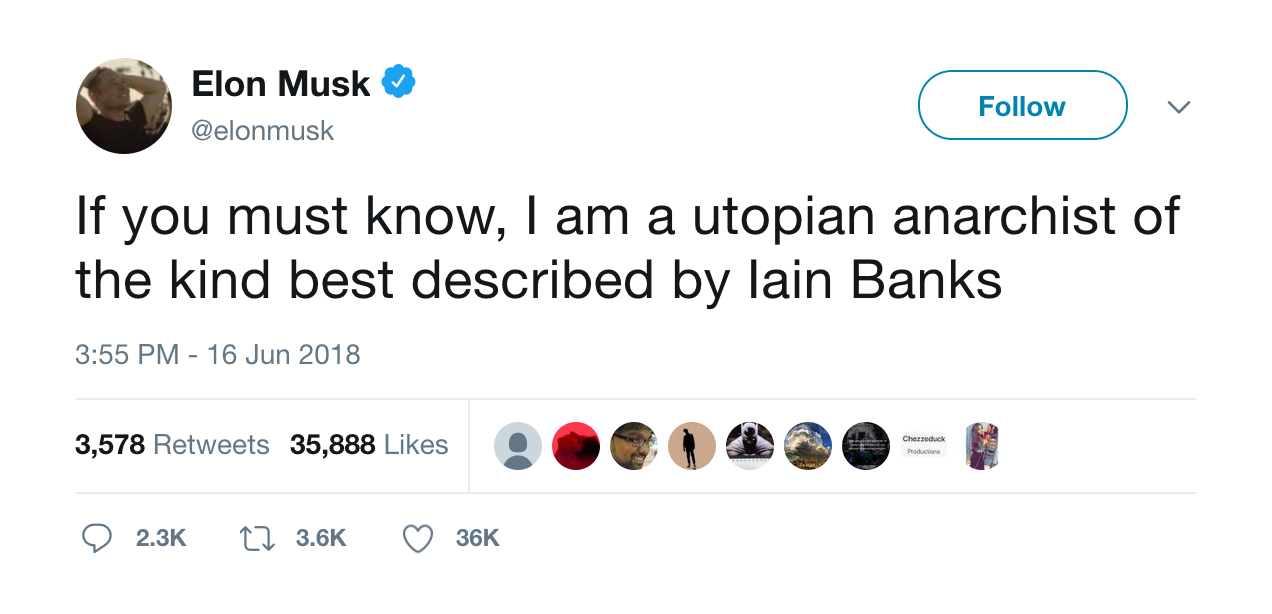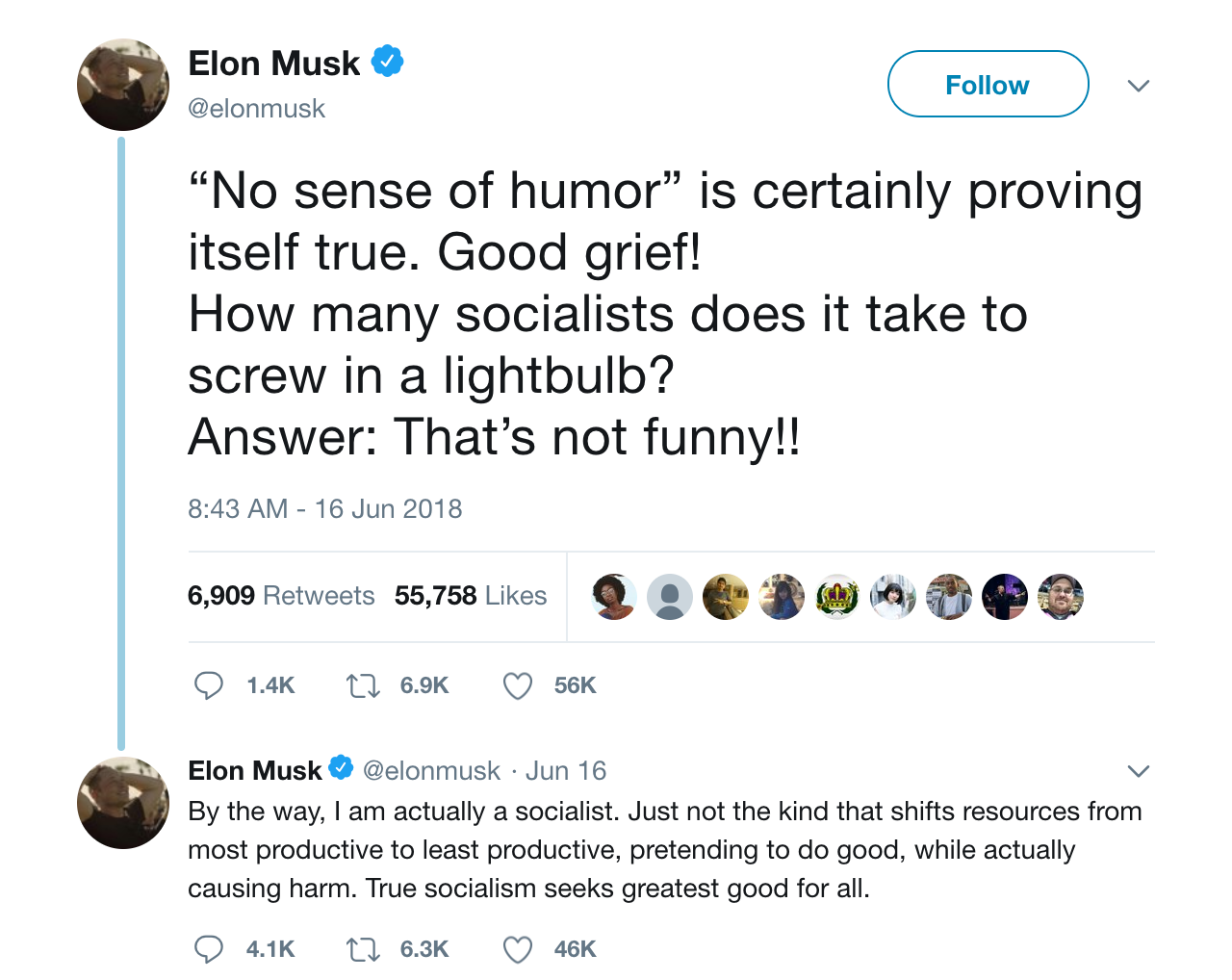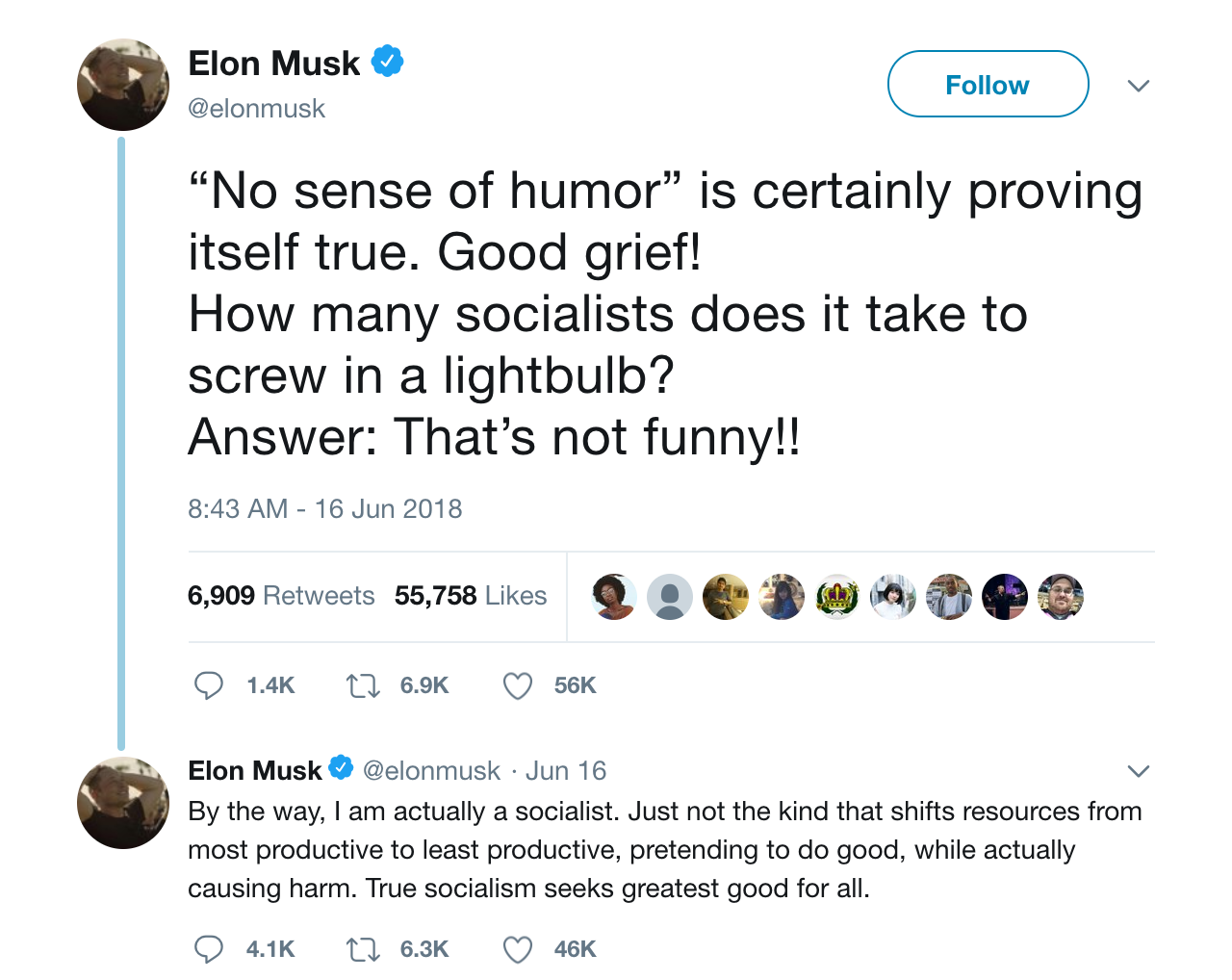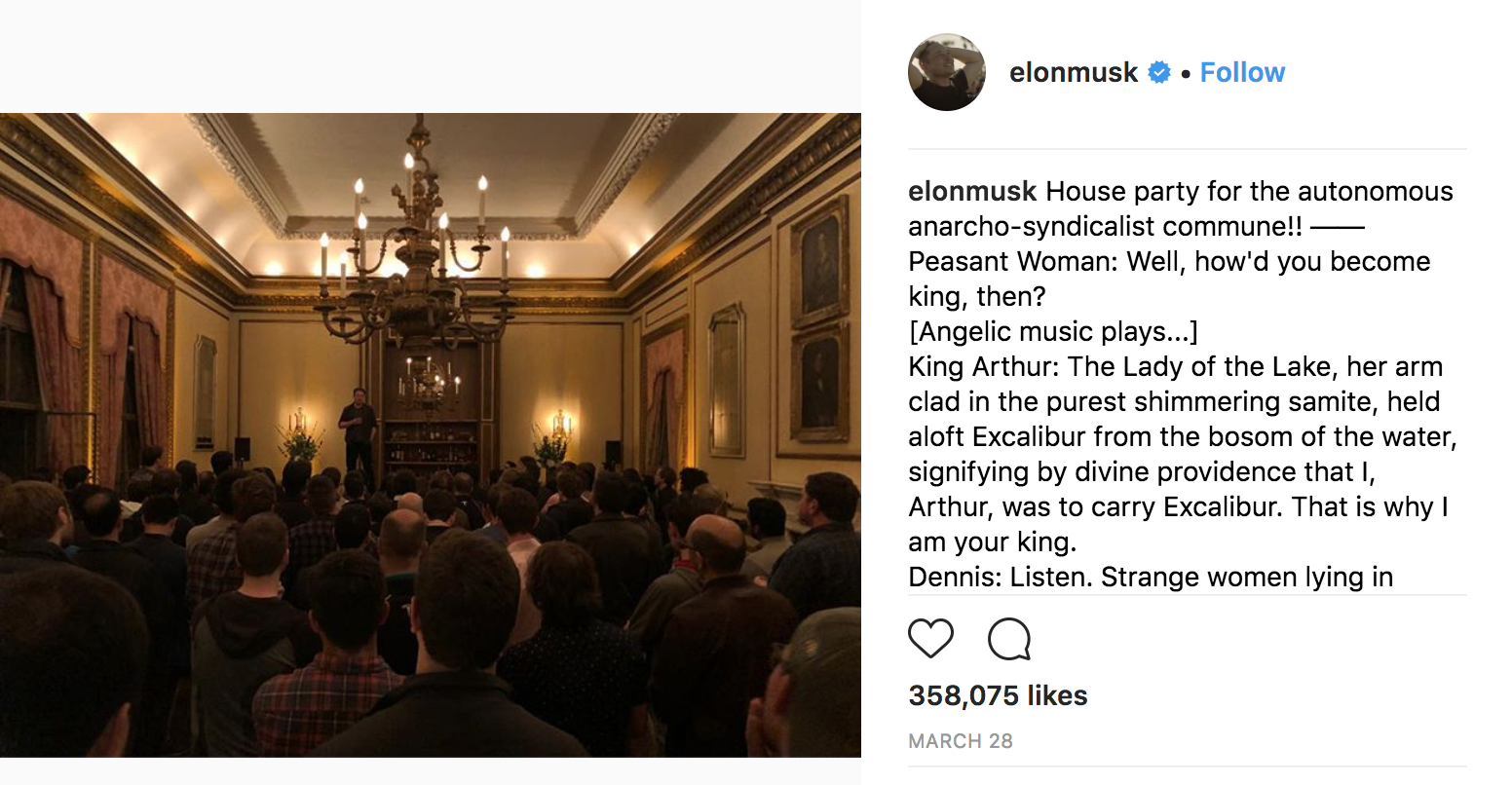Elon Musk's Ideology
The reason why Elon Musk is a utopian anarchist-socialist-capitalist.

First —I need to point out that Elon is about the most sane, rational person I know about. Yes, his goals may seem nonsensical, but that's only because we're analyzing his goals on a lower conceptual level —we think in terms of happiness, free time, productivity, and puppy videos, which have nothing to do with obtaining meaningful ends, which is what Elon is trying to do.
Meaningful ends? Yes, you know, a goal that when reached is meaningful —and otherwise amounts to more than what that end by itself entails. Money is an ends to living, but it's not meaningful because what do we live for then? Living may be meaningful, but it's not an end in it of itself —you don't live to live, you live to do things.
Elon's ideology is what will inform us as to why his pursuits are visionary —because he sees a brighter future that requires certain conditions to be met before it can exist. That's why he's working towards meaningful ends. The ends bring about that future, meaningful.
The Utopian Anarchist:

Anarchy is usually thought of as a state of government in which there is no government and therefore chaos reigns. This is why Elon has prefaced Anarchist with utopian —he believes in a state of government in which there is no government, but that can exist in a state of peace, order.
"What a strange man!" One might say because all our ideas on anarchy are contradictory to a stateless state that can exist with order, we believe laws and enforcement of them are the only thing keeping people in line and from acting out their every whim.
Of course, that's where the whole issue on gun control violence comes in —there's people who believe laws will remedy the situation, and those who don't (there are also people just want to own guns, but that's besides the point). While I don't want to make a statement on the necessity for a solution to gun violence, even if you outlaw guns, it won't solve the problem. This is obvious in the case of the failure of prohibition in the 1900s and the legalization of marijuana in California and other states in recent times. In each case, the law did nothing —the law followed what the people wanted to do: prohibition was repealed because people were drinking anyways, marijuana was legalized because people were already using it in large amounts anyways, therefore the solution also relies on figuring out how to get people to want to do something different from what they are already doing.
Elon believes that ultimately an anarchist state can exist because the laws, while they do create barriers to human behavior, the behavior itself, when in mass, is still the dominant force. It makes sense to focus on solving for human behavior rather than having politics.
Solving for human behavior? Yeh, like getting everyone on the same page so we don't want to kill each other or otherwise impede human progress. Can this ever happen? Aren't humans always at odds?
Well, maybe not. The answer to solving for human behavior is actually simple —it involves another question which is "Do people want different things?" This is pretty crucial, since if people fundamentally want different things in life, then we'll never have an anarchist state —people can't be socially conducive to each other if they have opposing ends. If I want to build a house and you want to blow up houses, it won't work.
But actually, people really don't want different things. People want the same things —well-being, prosperity, heart-felt relationships, progress, meaning, "a worthwhile and fulfilling life". It looks like fundamentally we're actually all striving for the exact same future, but if this is the case, why all the problems?
Well, Leo Tolstoy clues us in with a famous line from Anna Karenina, "All happy families are alike; each unhappy family is unhappy in its own way." Perhaps we can translate this to, "each happy person is alike; each unhappy person is unhappy in their own way." In other words, a utopian future, where everyone's needs and well-being are accounted for, are accounted for in the same way. We all require the same conditions to be happy, fulfilled, etc. Until we find a way to reach that state, we'll all be unhappy in different ways, hence, the multi-faceted nature of all the problems causing people pain and suffering. To solve all the problems, we need a handful of conditions that, when met, will resolve them. We'll have to agree on the right conditions first.[1]
Those conditions can be found in the belief that everyone should have the rights to self-determination —free from oppression and therefore free to become what one wants to become. With these rights, everyone pursues to their heart's content their highest yearning, which is always to the benefit of themselves and others. People work in parallel —meaning they are not obstructed by hierarchies and are free to form the bonds they wish to form out of freedom instead of necessity. This is the idealogical condition for a utopian anarchist state.
With complete freedom and ideological alignment, the role of government is not needed —which always provides protection to the people at the expense of freedom. This is why Elon is an utopian anarchist.
The Socialist:

"The greatest good for all."
With Elon's views on anarchy established, it's not so hard to see why he is also a socialist. He does not adhere to the government of socialism, which always seeks to add more laws and restrictions in order to benefit humanity, no, Elon rejects the socialist methodology since they oppress the conditions of the individual by creating more restrictions instead of liberating them. Socialism's mission is correct, however its methodology does not fulfill it's intent.
Effort does not equal positive results. Good intent doesn't imply proper ends. Just because you studied really hard, doesn't mean you'll ace the test —you have to study correctly. It's important to make sure the ideals we're striving for are actually arrived at through the methods we purport.
The solution is, of course, to take more care in the work being done, not to jump to conclusions, not to make assumptions, to be humble, and to take care that our intent matches our methodology and brings about the right ends.
The Capitalist:

Now, Elon doesn't explicitly identify with capitalism, but he is in fact, a capitalist since he works in a capitalist society. To not consider him a capitalist would be to fail to understand the complete picture —on his Instagram is this:

—"House party for the autonomous anarcho-syndicalist commune!!"
This holds the last key —anarcho-syndicalism is a revolution in which the workers in a capitalist society gain control of the economy by owning the means to production and are therefore able to influence that society and work towards decentralization of power. A socialist valued anarchy is what results. Anarcho-syndicalism is a method for overcoming capitalism within a capitalist society (a necessity since once a society is formed, you can't raze it to the ground and start over, reform is generally the only "peaceful" way to a different future).
It's possible... but not easy. Anarcho-syndicalism requires a lot of people to be on the same page to fight for a decentralized state. Also, there are other problems on Earth that are equally important to solve for which may not be possible during a revolution the scale that anarcho-syndicalism implies. First problems first. The projects Elon start are not random —they are focused on two conditions: making sure Earth is sustainable, liberating people. Since Elon works in a capitalist society, successful projects help those conditions and work towards the potential for an anarchist state.
Case examples:
- Tesla + SolarCity: energy sustainability and climate problems (sustainable Earth)
- The Boring Company: transportation (liberate people from traffic)
- OpenAI: to prevent an AI monopoly from destroying humanity (sustainable Earth)
- Pravduh: rate core truth of news articles (liberate people from false media)
- Then there's SpaceX...
{.square-list .content}
SpaceX is unique in that it doesn't tap into solving problems on Earth, it tries to escape it, but why would we want to escape Earth? Well, think about it —no laws, right? A fresh start!
Actually, no. If you thought Elon was trying to go to Mars in order to start a new society and draw out his own laws, that wouldn't be possible. There are laws already. Check them out here, but it turns out, these laws are actually good to have in existence. Take a read. I dare you.
The primary idea behind the Outer Space Treaty, the main space law, is that Space is to be considered a completely free and cooperative based uh... space.
Here's a few key quotes:
Emphasis is mine.
"Outer space, including the moon and other celestial bodies, shall be free for exploration and use by all States without discrimination of any kind, on a basis of equality and in accordance with international law, and there shall be free access to all areas of celestial bodies."
"Outer space, including the moon and other celestial bodies, is not subject to national appropriation by claim of sovereignty, by means of use or occupation, or by any other means."
"The moon and other celestial bodies shall be used by all States Parties to the Treaty exclusively for peaceful purposes. The establishment of military bases, installations and fortifications, the testing of any type of weapons and the conduct of military manoeuvres on celestial bodies shall be forbidden. The use of military personnel for scientific research or for any other peaceful purposes shall not be prohibited. The use of any equipment or facility necessary for peaceful exploration of the moon and other celestial bodies shall also not be prohibited."
"States Parties to the Treaty shall regard astronauts as envoys of mankind in outer space and shall render to them all possible assistance in the event of accident, distress, or emergency landing on the territory of another State Party or on the high seas. When astronauts make such a landing, they shall be safely and promptly returned to the State of registry of their space vehicle."
"In the exploration and use of outer space, including the moon and other celestial bodies, States Parties to the Treaty shall be guided by the principle of co-operation and mutual assistance and shall conduct all their activities in outer space, including the moon and other celestial bodies, with due regard to the corresponding interests of all other States Parties to the Treaty."
"All stations, installations, equipment and space vehicles on the moon and other celestial bodies shall be open to representatives of other States Parties to the Treaty on a basis of reciprocity. Such representatives shall give reasonable advance notice of a projected visit, in order that appropriate consultations may be held and that maximum precautions may betaken to assure safety and to avoid interference with normal operations in the facility to be visited."
The main idea is this: no one owns space, everyone is free to explore space, no weapons, help each other. In other words, its a complete form of freedom and equality: space belongs to everyone. It avoids the property problem.
In The Second Sex, Simone de Beauvoir say one of the key factors in women's oppression is not having the means to property. Since the man is the worker, he owns the property and therefore wants to pass his property onto his children —this effectively alienates woman because she (in those times) did not have equal access to jobs, could not find equality and was always reliant on the man for support since she could not support herself —she is labeled a leech.
Simone offers two solutions: balance out economic means or get rid of the concept of property. The second is actually preferred, since without ideas of property, ownership, there is no need to hoard what one owns for the next generation —there is no instinct for self-preservation, to be passed through an inheritance, since there is no ownership of objects. Men and women become equals in work and life since no sex is dependent on the other for their livelihood. Relationships are free, people may come and go as they please. In much the same way, space asks that all different nations unite under the singular banner of "humanity" as equals. In Space, there is no concept of the United States owning territory that the UK or Germany or China or France, etc. don't own as well —there is no territory, no division, space is completely free for all nations to explore and use.
The Outer Space Treaty is a dream come true for the utopian anarchist. It sanctifies people's right to exist in harmony: working towards aligned ends, attempting to better humanity, and having equal access to all manners of self-determination —in space.
Pulling it All Together
I can't verify everything I've said because I do not have access to Elon's brain, but maybe we can take a detour and say that this is what I'd like to make of Elon's brain. Otherwise, "what's the point?" why go to space?
Because you see, as a human there's only two different branches of philosophy —existentialism and nihilism. Nihilism says that nothing matters, there's no purpose, there's no meaning, existence is existence and that's all there is to it. Existentialism says that there's a purpose, there's a meaning, and it's up to you to go find it, or assign it, or whatever, but the choice is yours. Everything else follows only after we've decided on one of these two philosophies. The default is nihilism; if you want existentialism, you have to act with purpose. Elon decided on his purpose, that's why he can focus, what about us?
As of late there's been some great misunderstandings in the nihilism vs. existentialism debate —mostly because we don't think there is a debate anymore and everyone understands that life has purpose and meaning and all that good stuff. So what's the problem? Well, as I said above, intent does not imply positive causation. In other words, just because we believe in existentialism doesn't mean we're acting in accordance with it. Our actions do not have a foundation in existentialism, only our thoughts do. This is really a definition of hypocrisy.
There's a million of us out there who say that life is meaningful, that we want to make an impact, that life is process, "journey over destination!", that we have purpose(s), yet after all these declarations all I see is Netflix and Spotify, failed relationships and "getting laid", I see ennui —the constant starting and stopping of activities, the frenzy of occupation followed by a listless staring into the abyss waiting for the next idea, the next startup, the next girl, the next boy, the next opportunity, the next big thing, or whatever to draw attention away from one's current life and to give life meaning and purpose again. This is not meaning and purpose —it's the most intense form of nihilism because it pretends be to heavily involved and engaged when it's only for moments at a time. It doesn't care about anything, so it tries to forget itself in everything. What happens is an endless drifting and waiting for momentary meanings and purposes which added altogether provide no substance because there is no continuity between them, there's no direction, it's just a mess.
There's no declaration of what's worth doing and what is not, and that's the central problem; there is no focal point, and if there's no focal point, no North Star of purpose and meaning, then there can be no forward movement. One day you follow that star over there, then you pick a new one, and then that, an oh! that one is shiny, and where you end up is no where.
Life becomes a disorderly mess while we proclaim the room is clean, that we know what we're doing, but as much as we try to hide it, our dissatisfaction shows through and we don't know what to do. We pretend to be involved and try to fill our time, but we don't feel it, and no meaningful ends can be accomplished without convictions, an opinion —a feeling of right or wrong that allows a person to push through obstacles.
Part of the problem is there are forces that prevent us from being able to do what we'd like to do: working jobs, laws and regulations, identity oppression through culture (basically creating social outcasts through shaming), etc. We are not as free as we think, but this isn't an excuse to idle away the hours in pursuit of happiness. There are meaningful ends to work towards right now —the conditions for self-determination can be met, the world can enter into an era of unprecedented freedom —whether here on Earth or out in Space. There are people working towards that future. It's our job, to get on the same page, so when and if we get there, we're not confused.
It's not enough for a handful of people to bring us there, you can lead a horse to water, but you can't force them to drink —through all the efforts of all the people trying to make the world better and more free, it won't work if we don't recognize what a better world looks like. We'll end up throwing it away because it's different, not recognizing that it was also better.
This is not to say that everyone will be the exact same person, actually the idea that an anarchy can exists relies on the difference of people to account for all the roles a society needs for it to exist; if we all became writers, a society couldn't possibly function —therefore, this is not an objection to individuality, but in support of it. ↩︎